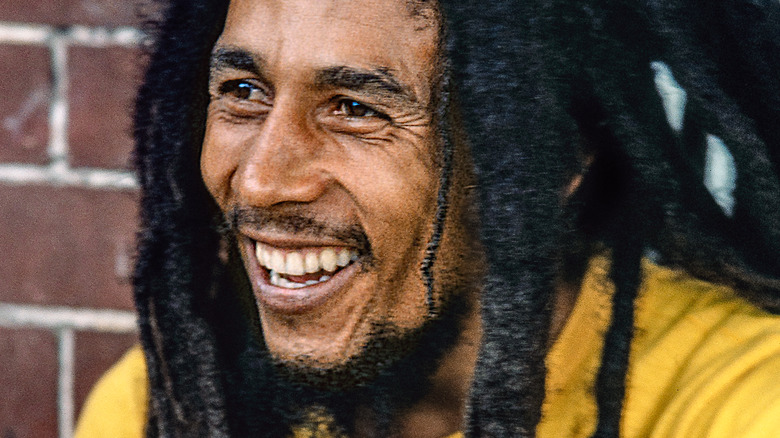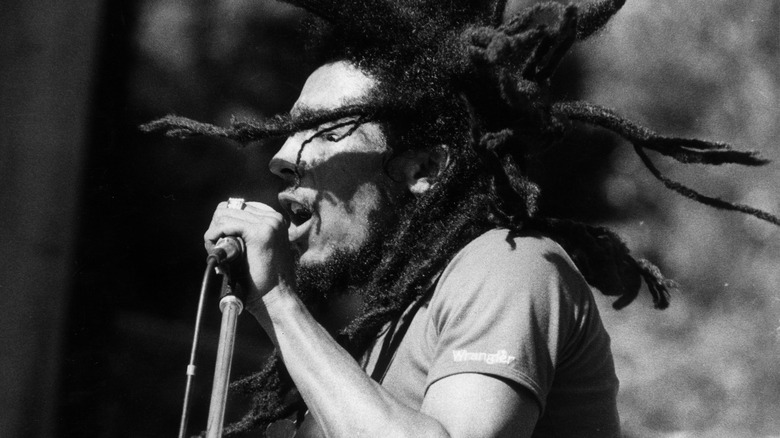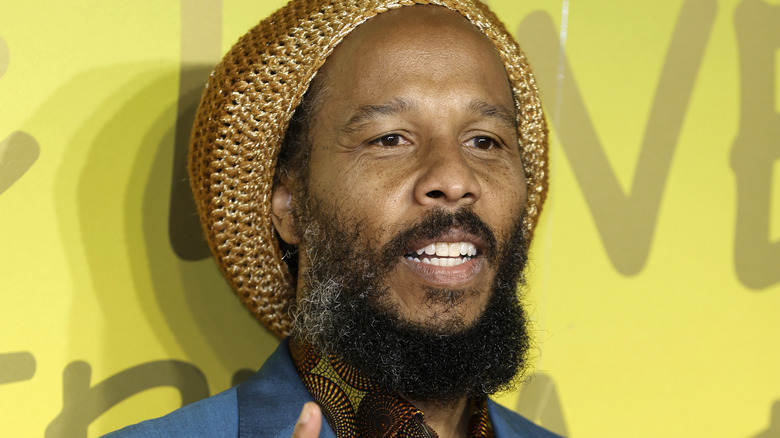These Were Bob Marley's Tragic Final Words
Bob Marley lay in a Miami hospital close to death from cancer. His head rested in the arms of his wife, Rita Marley, who sang an old hymn, "God Will Take Care of You." She suddenly broke down crying. "Bob, please, don't leave me," she told him, according to her book "No Woman, No Cry: My Life with Bob Marley." Bob looked up and responded. "Leave you, go where? What are you crying for? Forget crying, Rita! Just keep singing. Sing! Sing!"
Two of his young sons were also present in the days leading up to May 11, 1981, when the 36-year-old superstar who'd helped bring reggae to the world from his native Jamaica died. To his 9-year-old son Stephen, his last words were "Money can't buy life." The last time Bob saw his oldest son, Ziggy, who was 12, he called him over. "On your way up, take me up. On your way down, don't let me down," Ziggy recalled his father saying (via PBS). Bob Marley's final words to his son Ziggy, who went on to global fame as a musician in his own right, stuck with him. "A father telling his son that puts some responsibility on my shoulders," he mused. "He told me that, and I take it very seriously."
Thought it was a soccer injury
When Bob Marley wasn't making world-shaking music he could be found playing soccer. Ziggy recalled that his father was a "fanatical" soccer player. "Football helped him free his mind," Ziggy told The Guardian. While the sport was Bob Marley's refuge, it would also play a role in his early death. When a dark spot developed under one of his toenails on his right foot, Bob erroneously believed it was related to an injury he sustained while playing soccer. It wasn't. Doctors diagnosed it as a rare form of skin cancer called acral lentiginous melanoma, per the Express. He refused to have his toe amputated for religious reasons. Marley instead opted for less aggressive measures that didn't prevent the cancer from spreading.
While on the American portion of his world tour in 1980, Marley passed out while jogging in Manhattan's Central Park on the heels of two performances at Madison Square Garden. Doctors at Sloan Kettering in New York gave him only a few months to live. The cancer had spread throughout his body, including to the singer's brain. His manager, Danny Sims, told The New Yorker one of the doctors said Marley had "more cancer in him than I've seen with a live human being."
Eight months of treatment
Bob Marley's cancer journey was in some respects a literal one from Manhattan to Bavaria to Miami. After playing his final show in Pittsburgh on September 23, 1980, two days after learning the cancer had spread, Marley flew to a specialized clinic in Germany. There Dr. Josef Issels treated Marley using "unorthodox" methods that had been "scoffed at by leading European experts," according to The Gleaner.
The U.S. doctors believed Marley would be dead by December, but under the care of Issels, Marley survived another eight months. "Like so many other patients who come here, I was given up by the doctors to die," Marley told Associated Newspapers. "Now I know I can live. I have proved it." Eventually, Marley's body stopped responding to the treatment and he decided to return to Jamaica to die. He didn't make it home, instead checking into what was then known as Cedars of Lebanon Hospital in Miami in early May 1981.
Last stop: Miami
By the time Bob Marley checked into the hospital in Miami, he was rail thin and had cut off all his famous dreadlocks since he was too weak to hold their weight up. He died at 11:45 a.m. on Monday, May 11, 1981, five days after checking into the hospital, according to The Miami Herald. At the moment of Bob Marley's death, Ziggy (above) and Stephen weren't with their father. "The day he passed away, we were at our grandmother's house [in Miami]," Ziggy recalled (via YouTube). "And then I saw her coming down the stairs. And she didn't even have to say anything, because I kind of knew." Afterward, Stephen told his mother: "Mommy, you remember what Daddy says, 'No woman no cry.' ... So come, let's go to Jamaica."
Before the elaborate state funeral planned for Marley in Jamaica, his family held their own intimate memorial. "We had had a private final ceremony for Bob in Miami before we came home with his body," Ziggy told the Jamaica Observer. Bob Marley is gone but as Rita Marley pointed out in an interview with WBUR, he "didn't die, he went to rest. When you die you're forgotten. Bob has not been forgotten, so he lives on."



